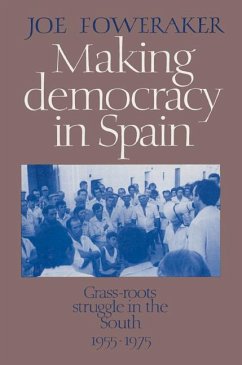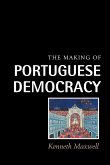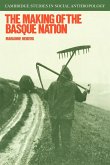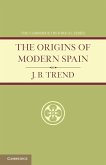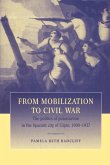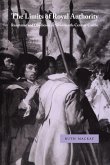The story of the unsung heroes whose struggles prepared the transition to democracy in Spain.
This book, exploring the making of democracy in Spain during the twenty long years before the death of Franco, seeks out the beginnings of democratic struggles at the grass roots of civil society. Rather than one more account of the transition to democracy in Spain, this is the story of the countless unsung heroes who prepared the political terrain of this transition. The story suggests that it was social needs and economic demands which spawned individual discontent and political dissent, but that the struggle itself required continual political organization and calculation. The book therefore explores the personal networks and political strategies which sustained the struggle, and reveals that their contribution to the making of democracy was often contradictory and always piecemeal. Democratic struggle is not defined by a single idea of democracy, but by myriad attempts to achieve more autonomous action and more effective forms of representation.
Table of content:
Preface; Introduction: personal networks, political strategies and the making of democracy; Part I. Personal Networks, Political Traditions and State Policies: 1. Unquiet hearts: the primitive world of the first political men; 2. The burden of hopes and hatreds: ideological traditions in clandestine circumstance; 3. Oligarchic unity and working-class divisions: a political economy of El Marco de Jerez; 4. Political clans and capitalist planning: a political economy of Francoism; Part II. Syndical Practices, Social Struggles and Political Protests: 5. The vertical syndicate: the mainstay of Franco's corporatist strategy; 6. The workers' commissions: the national picture compared with the movement in El Marco de Jerez; 7. Wage contracts, labour conflicts and political protests: the syndical practices of the labour movement; Part III. Political Practices, Repression and Strategic Responses: 8. The revolutionary paradox: the changing political line of the Spanish Communist Party; 9. A place in the struggle: personal networks and political practices in El Marco de Jerez; 10. The other side of darkness: the repressive practices of the Franco regime; 11. Contingent connections: the relationship between the workers' commissions and the Spanish Communist Party; 12. Fighting with two faces: the strategic combination of legal and clandestine spaces; Part IV. Political Strategies and the Democratic Project: 13. Democratic transformation and the transition to democracy: the political project of the labour movement, 1955-1985; 14. Corporatist strategies and the transition to democracy: the institutional terrain of the struggle; 15. Personal networks and political strategies: Spanish civil society in the struggle for democracy; Bibliography; Index.
This book, exploring the making of democracy in Spain during the twenty long years before the death of Franco, seeks out the beginnings of democratic struggles at the grass roots of civil society. Rather than one more account of the transition to democracy in Spain, this is the story of the countless unsung heroes who prepared the political terrain of this transition. The story suggests that it was social needs and economic demands which spawned individual discontent and political dissent, but that the struggle itself required continual political organization and calculation. The book therefore explores the personal networks and political strategies which sustained the struggle, and reveals that their contribution to the making of democracy was often contradictory and always piecemeal. Democratic struggle is not defined by a single idea of democracy, but by myriad attempts to achieve more autonomous action and more effective forms of representation.
Table of content:
Preface; Introduction: personal networks, political strategies and the making of democracy; Part I. Personal Networks, Political Traditions and State Policies: 1. Unquiet hearts: the primitive world of the first political men; 2. The burden of hopes and hatreds: ideological traditions in clandestine circumstance; 3. Oligarchic unity and working-class divisions: a political economy of El Marco de Jerez; 4. Political clans and capitalist planning: a political economy of Francoism; Part II. Syndical Practices, Social Struggles and Political Protests: 5. The vertical syndicate: the mainstay of Franco's corporatist strategy; 6. The workers' commissions: the national picture compared with the movement in El Marco de Jerez; 7. Wage contracts, labour conflicts and political protests: the syndical practices of the labour movement; Part III. Political Practices, Repression and Strategic Responses: 8. The revolutionary paradox: the changing political line of the Spanish Communist Party; 9. A place in the struggle: personal networks and political practices in El Marco de Jerez; 10. The other side of darkness: the repressive practices of the Franco regime; 11. Contingent connections: the relationship between the workers' commissions and the Spanish Communist Party; 12. Fighting with two faces: the strategic combination of legal and clandestine spaces; Part IV. Political Strategies and the Democratic Project: 13. Democratic transformation and the transition to democracy: the political project of the labour movement, 1955-1985; 14. Corporatist strategies and the transition to democracy: the institutional terrain of the struggle; 15. Personal networks and political strategies: Spanish civil society in the struggle for democracy; Bibliography; Index.

